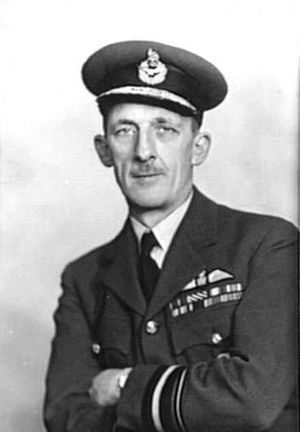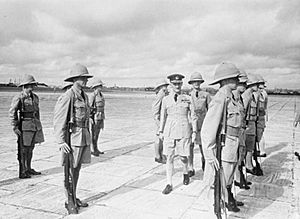Conway Pulford facts for kids
Quick facts for kids
Conway Pulford
|
|
|---|---|
 |
|
| Born | 26 January 1892 Agra, India |
| Died | 10 March 1942 (aged 50) Chibia, Dutch East Indies |
| Buried |
Kranji War Cemetery, Singapore
|
| Allegiance | United Kingdom |
| Service/ |
Royal Navy (1905–18) Royal Air Force (1918–42) |
| Years of service | 1905–1942 |
| Rank | Air Vice Marshal |
| Commands held | RAF Far East (1941–42) No. 26 (Training) Group (1937–38) RAF Heliopolis (1932–34) RAF Bircham Newton (1931–32) No. 7 Squadron (1929–31) No. 210 Squadron (1920) |
| Battles/wars | First World War Second World War |
| Awards | Companion of the Order of the Bath Officer of the Order of the British Empire Air Force Cross Mentioned in Despatches Croix de guerre (France) |
| Spouse(s) | Elinore Mildred Pulford |
Air Vice Marshal Conway Walter Heath Pulford (born January 26, 1892 – died March 10, 1942) was a very important officer in the Royal Air Force during World War II. He was in charge of British air forces during the Japanese invasion of Malaya and the later fall of Singapore.
Pulford sadly passed away from exhaustion and a serious illness called malaria. This happened after his escape ship was attacked by Japanese planes and got stuck on an island.
Early Life and Beginnings
Conway Pulford was born in Agra, India. His parents were Russell Richard and Lucy Anne Pulford.
Pulford started his military journey in the Royal Navy in 1905. He began as a Naval Cadet at the Royal Naval College, Osborne. He served on several ships, including HMS Russell and HMS Lion. In December 1914, he became a pilot on the aircraft carrier HMS Ark Royal.
Royal Air Force Career
In January 1920, Pulford moved from the Navy to the newly formed Royal Air Force (RAF). He quickly became a squadron commander in 1921. Pulford also attended special colleges to learn more about military strategy and leadership. These included the RAF Staff College in 1922 and the Imperial Defence College in 1929.
World War II Challenges
In 1941, Pulford tried to make the RAF stronger in the Far East. This was to help all the forces under the British Far East Command. However, the Far East was not seen as a top priority before the Japanese attack on December 8, 1941. So, not much was done to prepare.
When the war started, Air Vice Marshal Paul Maltby joined Pulford's small team as his second-in-command. Pulford was given permission to leave on February 5, 1942. Ten days later, Pulford and his naval partner, Rear Admiral Ernest John Spooner, were among the last to leave.
Their ship, the Royal Navy ML 310, was attacked by Japanese aircraft. It was forced to run aground on an uninhabited island called Chibia (Tjebia). This island was known for malaria. The survivors managed to stay alive for two months. However, they were eventually forced to surrender to the Japanese. Sadly, Air Vice Marshal Pulford and Rear Admiral Spooner both passed away from exhaustion and malaria.
Because Pulford did not arrive in Java, Maltby took over command of the RAF Far East Command. Maltby was later captured and spent the rest of the war as a prisoner of war of the Japanese.


